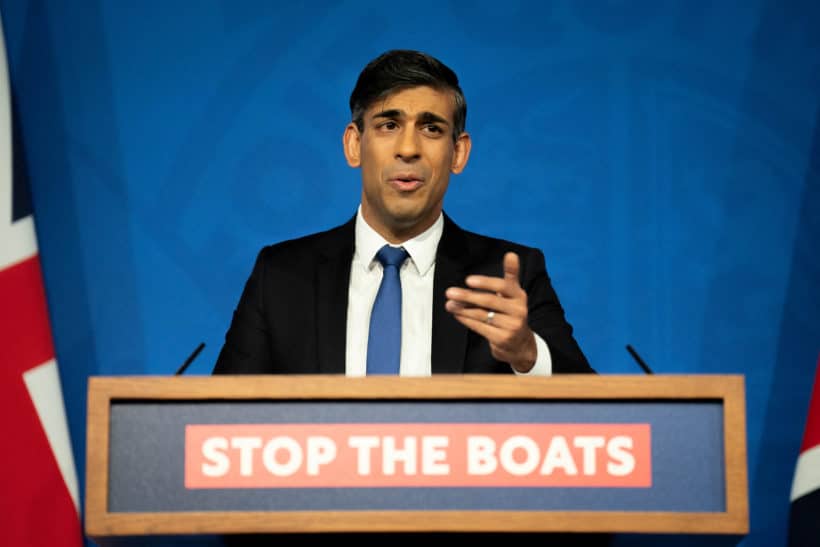
LONDON, Dec 12 (Reuters) – British Prime Minister Rishi Sunak faces the biggest parliamentary test of his premiership on Tuesday when lawmakers vote on his divisive plan to send asylum seekers to live in Rwanda.
The UK Supreme Court ruled last month that Rwanda was an unsafe place to send those arriving in small boats on England’s southern coast, and that the policy would breach British and international law.
In response, Sunak has agreed a new treaty with the east African country and brought forward emergency legislation to override domestic and international human rights law.
The move has deeply divided his party, alienating both moderates, who are worried about Britain breaching its human rights obligations, and right-wing politicians, who contend it does not go far enough.
“We believe the best solution here is we should pause the legislation today, we should come back with a new bill,” one Conservative lawmaker, Simon Clarke, told BBC Radio.
Lawmakers on the right of the party, who have not said whether they will abstain or vote against the government, believe the bill will still allow asylum seekers to appeal against deportation.
The government’s legal advice said access to courts formed part of Britain’s tradition of liberty and justice, available even in wartime.
Governments around the world are grappling with rising migration levels, and some are following the British plan to see if it will work. French lawmakers rejected their immigration bill last night, in a blow to President Emmanuel Macron.
CRUCIAL VOTE
The British parliament will hold the first vote on the law on Tuesday evening. It would only take about 30 Conservative members of parliament to vote with opposition parties to defeat the bill.
Even if it passes, Sunak is likely to face attempts to toughen it up with amendments at later stages, as well as opposition in the House of Lords, the unelected upper chamber.
Defeat would be a huge embarrassment for Sunak – no government has lost a vote at this early stage in the parliamentary process since 1986 – and it would severely weaken his authority over his party.
The battle has echoes of parliamentary showdowns over Brexit from 2017-19, when former Prime Minister Theresa May suffered repeated defeats following rebellions by large numbers of Conservative politicians, eventually leading to her exit.
Sunak, who replaced Liz Truss as prime minister last year after she was forced out, has made stopping boat-arrivals one of his biggest priorities. About 29,000 asylum seekers have arrived this year, down around one-third compared with last year.
But they remain a highly visible symbol of the government’s failure to control Britain’s borders – a key promise of campaigners for Brexit.
The government has already paid 240 million pounds ($301 million) to Rwanda even though it only has the capacity to settle hundreds of refugees a year from Britain and no one has yet been sent to the country.
In a day of political drama in Westminster on Monday, lawmakers from different factions of the governing Conservative Party held meetings throughout the day to decide how to vote.
In a boost late on Monday, a centrist group of lawmakers in the One Nation faction recommended that its members back the bill but warned that they would not accept any amendments that toughened the legislation at a later stage.
Sunak hosted some lawmakers on the party’s right wing for breakfast on Tuesday in a last ditch attempt to convince them to back the bill.
($1 = 0.7971 pounds)
(Additional writing by Kate Holton, Editing by Rosalba O’Brien and Christina Fincher)

